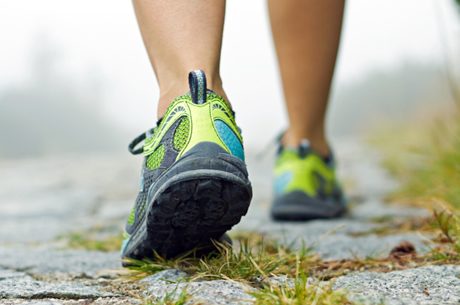Fart walks are the new thing, popularized on Tik Tok. In fact, a quick ‘fart walk’ might be just what you need to end your day.
Now that it’s 2024, we’ve graduated from hot girl walks to a slightly different version: Consider this the year of the fart walk.
Mairlyn Smith, a TikTok creator who goes by the apt handle @mairlynthequeenoffibre, introduced us all to the concept in a video she posted. Every night, she and her husband lace up their running shoes about 60 minutes after dinner and head out. “Now, why do we do this?” she says in the video. “Well, we eat a lot of fiber, so we have gas—everybody does—and, yeah, you fart while you walk. So that’s why I named it that.”
This isn’t just a cute marital routine (presumably they give each other some breathing room); Smith just might be onto something when she says the walks help her “age wonderfully.” There are a few specific physical benefits she points to: It helps ease any after-dinner bloating and reduces the risk of developing type 2 diabetes, Smith tells SELF.
GI Doctors Recommend Fart Walks
GI doctors quickly entered the chat on TikTok to back up Smith’s claims. Of course, you can’t believe everything you hear on social media (especially health-wise), so we spoke with Lisa Ganjhu, DO, a gastroenterologist at NYU Langone Health, for the inside scoop on all things fart walking—and to see if it’s time we all let one rip.
Turns out, even just a little bit of exercise can indeed help break up that bloated feeling: A post-meal stroll kick-starts digestion. “When you are moving, your GI tract is also moving,” Dr. Ganjhu tells SELF. This helps trigger gut motility, or movement of your intestines, which is essential for properly breaking down food. “There needs to be motion to help move the food along,” she says. “When you’re walking and moving around, you’re basically helping the motility part of the digestive tract.” (That might explain why you often feel so damn bloated after eating on an airplane or a train, where you can’t move around freely.)
Research Supports Post-Meal Walking for Digestion
And research backs this up: Post-meal activity has been shown to speed stomach emptying and colon transit, and, according to a separate study in the American Journal of Gastroenterology, even mild activity after a meal was enough to significantly reduce bloating. What’s more, boosting your gut motility and moving the food out quickly can also help with heartburn or gastroesophageal reflux disease (GERD), Dr. Ganjhu says—there’s simply less time for the digestive acids to do their thing.
As for the claim that a fart walk can protect against diabetes? Any type of exercise can help keep your blood sugar in check, Dr. Ganjhu says. And an after-dinner stroll might just be a great way to do it: A study in the journal Nutrients found that a walk after eating can help stabilize your blood sugar levels. That’s important, since repeated spikes over time can make your body less sensitive to insulin, which can increase your risk of developing type 2 diabetes.
Another great thing about the fart walk is that you don’t have to stroll for long to reap the benefits. As little as 10 minutes of movement can make a difference in bloating, according to a 2021 study. And you can keep it chill too: One study in the European Journal of Applied Physiology and Occupational Physiology found that stomach emptying increased significantly with moderate walking but decreased during high-intensity exercise like running. So think toot trot, not gassy gallop.
“It’s just walking and passing gas,” Dr. Ganjhu. “There is no specific time or distance or intensity required.”
Basically, don’t overthink the fart walk. Any kind of gentle movement after your meal is likely to help you feel even just a little bit better—and not just physically, either. According to Smith, fart walks bring a social wind-down aspect to the day and allow her and her husband to reconnect as a couple too.
“And we both think farts are funny, which adds to the laughter every evening,” Smith says.
Click here to read more about fart walks.






